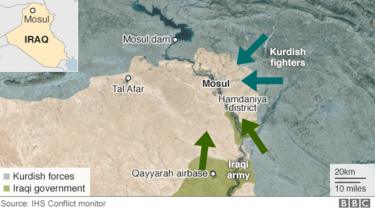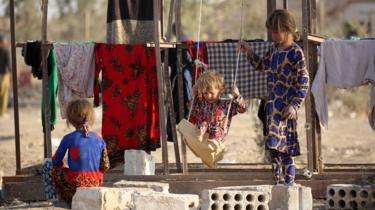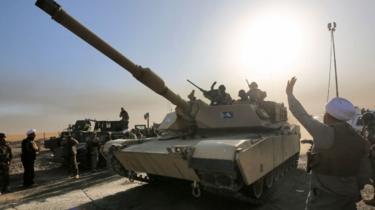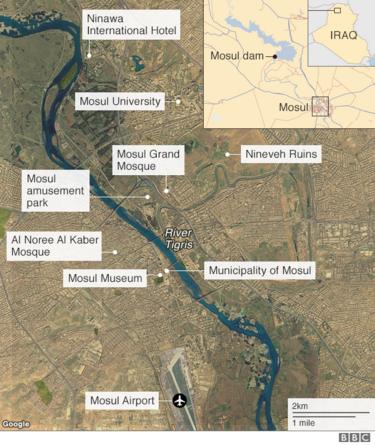Iraqi forces are "ahead of schedule", the Pentagon says, as they begin the second day of the battle to retake Mosul from so-called IS fighters.
But Pentagon spokesman Peter Cook warned it "could take some time" as it remained to be seen whether Islamic State (IS) would "stand and fight".
The coalition of forces launched their push towards the city in the early hours of Monday.
IS seized Mosul, then Iraq's second-largest city, in June 2014.
The extremists' leader Abu Bakr al-Baghdadi then chose Mosul as the place to announce the forming of a caliphate, so retaking the city would be "symbolic", according to Mr Cook.
- Mosul: Iraq's beleaguered second city
- UN prepares for aftermath 'chaos'
- Battle must navigate ethnic rivalries
- Is so-called Islamic State finished?
- Voices from Mosul as the battle nears
Mr Cook told reporters in Washington: "Early indications are that Iraqi forces have met their objectives so far, and that they are ahead of schedule for this first day. This is going according to the Iraqi plan - but again, it's early, and the enemy gets a vote here. We will see whether ISIL [IS] stands and fights.
"We are confident no matter what, however, that the Iraqis have the capabilities to get this job done, and we stand ready to support them, along with the rest of the coalition."
A coalition of 30,000 Iraqi and Kurdish Peshmerga forces and Sunni tribal fighters began their advance on lS's last major stronghold in the country after months of planning on Monday.
It is thought between 4,000 and 8,000 IS fighters remain in Mosul.

The Kurds seized several villages in the first few hours of the operation, and announced on Monday evening they had achieved all their key objectives, including recapturing 200 sq km and nine villages in under 24 hours.
They also secured an additional significant stretch of the Irbil-Mosul road.
One Kurdish general told the BBC's Orla Guerin: "We have a powerful enemy, They are not just fighting the Kurds or the Shia, they are fighting the whole world.
"We want to defeat them for everyone's sake."
But as the fighting gets closer to the city, concerns have been raised for the safety of civilians still trapped in the area, with British International Development Secretary Priti Patel said the protection of civilians must be a "paramount concern".
"Retaking Mosul will be an important step towards defeating Daesh [IS] in Iraq and ending its tyranny over the civilian population in the city," she said.
"However, with up to one-and-a-half million people still living in the city, it is clear that their protection and wellbeing must be a paramount concern."
 AFP
AFP
Already, the Iraqi government has dropped thousands of leaflets on Mosul telling residents what to do during the offensive.
"My understanding is that there may be as many as seven million leaflets dropped in the next 48 hours or so to try and educate the population of Mosul as to the safest way to conduct themselves as this fighting plays out," Mr Cook said..
The BBC understands that British aircraft have also been involved in Monday's coalition air strikes on Mosul.
The RAF has been providing support to Iraqi troops in the build-up to the operation and will continue to play a "leading role" in the fight against IS, UK Defence Secretary Michael Fallon said.
Who is fighting?
About 30,000 pro-government troops are involved in the operation. The main assault is being led by Iraqi army troops.
About 4,000 Kurdish fighters are trying to clear villages to the east of Mosul, to allow the army to move in.
 AFP
AFP
US Special Operations personnel are advising forces on the ground. Elite Iraqi counterterrorism forces are expected to join in the coming days.
An estimated 4,000-8,000 Islamic State fighters are defending the city.
Why Mosul matters
Mosul, the oil-rich capital of Nineveh province, is Iraq's second-largest city. IS militants overran it in June 2014.
Its capture became a symbol of the group's rise as a major force and its ability to control territory. It was there that IS leader Abu Bakr al-Baghdadi proclaimed a "caliphate" in parts of Iraq and neighbouring Syria.

The city was one of Iraq's most diverse, comprising ethnic Sunni Arabs, Kurds, Assyrians and Turkmens, as well as a variety of religious minorities.
While members of those minorities largely fled the onslaught by IS, many local Sunni Arabs initially welcomed the militants, angered by the sectarian policies of the previous Shia Arab-led central government.
But after two years of brutal IS rule, opposition has reportedly grown inside Mosul.
One major concern for those still there is the involvement of Shia militiamen in the offensive, after they were accused of sectarian abuses in other cities that have been recaptured.
Prime Minister Haider al-Abadi has sought to reassure them by saying only Iraqi security forces would be allowed to enter Mosul.
Even if IS is driven out of Mosul, the group will still control areas of northern and eastern Iraq.
What about the civilians in Mosul?
Up to 100,000 Iraqi civilians may flee to Syria and Turkey to escape the military assault in Mosul, the UN says.
The UN High Commissioner for Refugees hasissued an appeal for an additional $61m (£50m) to provide tents, camps, and winter items such as blankets for displaced people inside Iraq and the two neighbouring countries.
UN humanitarian chief Stephen O'Brien said: "I am extremely concerned for the safety of up to 1.5 million people living in Mosul who may be impacted."
Many are expected to be caught in the fighting. There are fears that residents could be used as human shields by IS.
As many as a million people could be forced to flee their homes.
Most are expected to leave "with only the clothes on their backs," Becky Bakr Abdulla of the Norwegian Refugee Council told the AFP news agency.
No comments:
Post a Comment